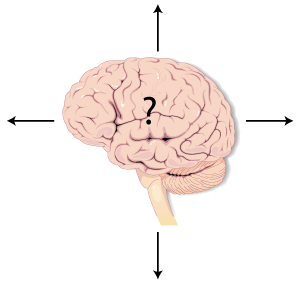

 |
Imagine that you are hungry and you want to go to the market to buy fish. You will need to finely judge a lot of variables: |
In our brains billions of neurons nerve cells (neurons) receive inputs, process these inputs and deliver information. Each individual cell is full of proteins that carry out the processes that happens within.
|
We pose these questions: |
 Link to source |
Thinking requires the ability to sense and to make judgements on how to proceed based on what is sensed. At the level of a brain, brain areas receive sensory inputs from other brain areas. At the level of individual cells, information from other cells is similarly received. Within the cell, proteins act similarly, receiving information from other proteins. At all of these levels a decision is made based on these sensory inputs whether or not to perform one action or another.
All of these decision-making mechanisms are not independent. The decision a cell makes is based not only on other cells but on the decisions its proteins make. This makes a cell more complex than its constituent parts as it has a greater number of variables that can be sensed. It is also capable of more complex outputs by similar reasoning. This hierarchical nature of the brain equips us with the ability to perform extremely complex tasks. You might ask, given that our DNA encodes for these proteins, if DNA itself is not ultimately the decision-maker. However, be aware that proteins can make decisions in the absence of DNA, but DNA cannot make decisions in the absence of proteins.
In our view, proteins are the least complex level capable of making biological decisions. Is this your view also? Do you think that because proteins are encoded in our DNA that our genes are also thinkers? or maybe you think it is the individual units that make up the sequence of these genes? Maybe you even think that atoms are capable of computing too?
Does this mean that we have no free will and our descisions are ultimately programmed to react to our environment? Can we explain emotions by this thinking? Why do we make irrational decisions? Is it possible to create a thinking biological robot?
 Protein interactome for a fruit fly |
To carry out normal functions the brain, and indeed the cellular units of the brain, as well as their constituent proteins, need to be exquisitely organised. Just as our nerves are arranged in pathways (e.g. a reflex arc) our proteins are similarly functionally arranged. Neurons in the brain that have large numbers of connections to other nerve cells can perform much more complex functions than those cells that have less. Likewise, proteins that have large numbers of connections to surrounding proteins tend to be functionally more important than proteins with fewer connections. We refer to these centres of importance as 'hubs'. Cells/proteins with fewer connections which are peripheral to the process and which may be shared between processes we term 'nodes'. These nodes are important in providing sophistication to the underlying processes. Nodes and hubs interact in networks and these networks may interact with other networks to make larger networks (actomes). Both the cells in the brain and proteins within these cells are highly interconnected and this gives a level of stability and robustness so that we are not usually reliant on single cells/proteins should these fail. We cannot understand how the cell or the brain functions without understanding how these networks are organised. |
Biological Networks, what do they look like?
How and where do we think?
Proteins as decision-makers
Biological organisation
For further details of how to participate in this annual competition see 2007 Home Page
Back to 'Imagining The Brain' Home Page
Background to project
Back to McMahon Home Page